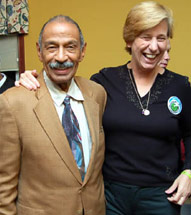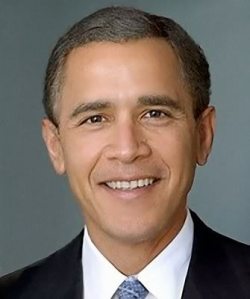
by Stephen C. Webster
January 13, 2009
from
RawStory Website
Everyone wants to know: will Obama order investigations into the Bush
administration's abuses of power? But, perhaps a better question would be:
if he doesn't, who will?
 House Judiciary Chairman
John Conyers, Jr. (D-MI), it appears, will at least
try.
House Judiciary Chairman
John Conyers, Jr. (D-MI), it appears, will at least
try.
Conyers published a 487-page report Tuesday titled, "Reining
in the Imperial Presidency: Lessons and Recommendations Relating to the
presidency of George W. Bush."
Conyers' report makes 47 recommendations "designed to restore the
traditional checks and balances of our constitutional system," reads the
foreword.
Recommendations include the establishment of a
'blue ribbon' commission to fully investigate the Bush administration, and
the launch of criminal probes.
"Even after scores of hearings,
investigations, and reports, we still do not have answers to some of the
most fundamental questions left in the wake of Bush’s Imperial
Presidency," Conyers said in a release.
"Investigations are not a matter
of payback or political revenge – it is our responsibility to examine
what has occurred and to set an appropriate baseline of conduct for
future administrations."
On Jan. 6,
Conyers introduced a bill that, if
passed, would create the "Commission on Presidential War Powers and Civil
Liberties," which would seek to root out President Bush's abuses.
“The Bush Administration’s approach to power
is, at its core, little more than a restatement of Mr. Nixon’s famous
rationalization of presidential misdeeds: 'When the president does it,
that means it’s not illegal,'" Conyers wrote in the report's foreward.
Constitutional law professor Jonathan Turley
told MSNBC's Keith Olbermann on Monday,
"We now have President Bush speaking quite
candidly that he was in the loop, we have Dick Cheney who almost bragged
about it. The question for Barack Obama is whether he wants to own part
of this by looking the other way."
Obama told ABC's George Stephanopoulos on
Sunday,
"We have not made final decisions, but my
instinct is for us to focus on how do we make sure that moving forward
we are doing the right thing. That doesn't mean that if somebody has
blatantly broken the law, that they are above the law. But my
orientation's going to be to move forward."
"If waterboarding is torture - and Barack Obama has said that it is
torture," Turley emphasized, "and torture is a war crime, then the
president has committed a war crime if he did order waterboarding. You
have to do some heavy lifting to avoid the simplicity of that logic."
"What I would want to do is to have my Justice Department and my
Attorney General immediately review the information that's already there
and to find out are there inquiries that need to be pursued," Obama told
Philadelphia Daily News reporter Will Bunch in April 2008.
Obama added,
"if crimes have been committed, they should
be investigated," but agreed with Bunch's assertion that the effort
could turn into a "partisan witch hunt" that threatens to consume his
first term.
"Now, if I found out that there were high officials who knowingly,
consciously broke existing laws, engaged in cover-ups of those crimes
with knowledge forefront, then I think a basic principle of our
Constitution is nobody above the law - and I think that's roughly how I
would look at it," he concluded.

Is it real?
Last year, Conyers came under heavy criticism for allowing Rep. Dennis
Kucinich (D-OH) to present and speak about articles of impeachment against
Bush and Cheney, but
prohibiting any committee vote on the measure.
Prior to the Democrats' takeover of the House in 2006, he penned
a Washington Post editorial in which he all but promised he wouldn't.
But by
August of 2008, he seemed to have warmed.
"Nancy Pelosi has impeachment 'off the
table,' but that's off her table, it is not off John Conyers' table,"
the Michigan Democrat said during a town hall meeting in his district
Aug. 28.
"Nancy Pelosi, who I actually supported, cannot prevent me from
introducing an impeachment resolution against, well I've got a long list
of people who are eligible," said Conyers.
The statement seems in contradiction to Conyers'
Washington Post editorial.
"It was House Republicans who took power in
1995 with immediate plans to undermine President Bill Clinton by any
means necessary, and they did so in the most autocratic, partisan and
destructive ways imaginable," he wrote.
"If there is any lesson from
those 'revolutionaries,' it is that partisan vendettas ultimately
provoke a public backlash and are never viewed as legitimate.
"So, rather than seeking impeachment, I have chosen to propose
comprehensive oversight of these alleged abuses. The oversight I have
suggested would be performed by a select committee made up equally of
Democrats and Republicans and chosen by the House speaker and the
minority leader.
"The committee's job would be to obtain answers - finally. At the end
of the process, if - and only if - the select committee, acting on a
bipartisan basis, finds evidence of potentially impeachable offenses, it
would forward that information to the Judiciary Committee. This
threshold of bipartisanship is appropriate, I believe, when dealing with
an issue of this magnitude."
This promise appears to be the basis of his
proposed 'blue ribbon' commission.
"There's a big debate going on about holding
the previous administration accountable for [its] actions, and I would
say for the time being that the Obama team is focused properly on the
future," says Sen. Dick Durbin in a
Tuesday report by National Public
Radio.
"Our economy is so weak; we're in desperate need of jobs. Before
we start looking at the pages of history in the Bush administration, we
should be looking at the obvious need to create jobs and create a new
economic climate in this country."
And Conyers' commission would do just that: take
political pressure to pursue prosecutions off of Obama, placing the onus on
the investigatory body.
However,
"a commission with no power to punish anyone
except through shame is powerless in an age of shamelessness,"
writes David Swanson, co-founder of
Afterdowningstreet.org and press secretary
for the 2004 Kucinich for President campaign.
"The commission's subpoenas would be
enforced through the courts, allowing the process to be dragged out well
beyond a year and a half, or allowing witnesses to refuse compliance.
"All of this delay would simply serve to bolster claims that the crimes
of the past eight years are unimportant because in the past. And if the
commission offered criminal immunity to witnesses in order to entice
them to testify, then its result would be permanently blocking
prosecutions in the name of revealing the 'truth.'"
"There's no real question that crimes were committed here by [Obama's]
predecessor," Turley said on Monday.
"And he can either begin his
administration as a man of principle, and allow the law to take us
wherever it may lead, or he will inherit the same type of moral
relativism that really corrupted the previous administration. I'm going
to say a silent prayer for principle."

 House Judiciary Chairman
John Conyers, Jr. (D-MI), it appears, will at least
try.
House Judiciary Chairman
John Conyers, Jr. (D-MI), it appears, will at least
try.